-
A Legacy of Faith
Written by Deanna Brooks, volunteer with Iron Rose Sister Ministries in Arkansas
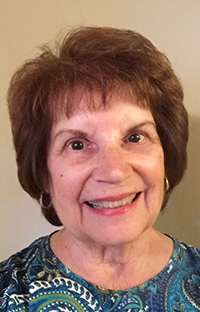
“Legacy” is defined as a long-lasting impact of action. We all have a legacy that goes in two directions: influence on us from those who went before us, and our influence on those who come along behind us.
Paul wrote in 2 Timothy 1:5 (ESV), “I am reminded of your sincere faith, a faith that dwelt first in your grandmother Lois and your mother Eunice and now, I am sure, dwells in you as well.”
Not everyone has a parent or grandparent to lead them. We need to be watchful for those we can help.
2 Timothy 2:2 is important in our walk of faith; it tells us to share what we know. “What you have heard from me in the presence of many witnesses entrust to faithful men, who will be able to teach others also.” Our legacy of faith is an ongoing chain where one shares what he learns, then that person shares with someone else… and the message continues to spread.
Think about how you learned to cook. For many of us, we were taught by a mother or grandmother, and when we had children, we taught them (and maybe some of their friends). Now we see our children teaching their children to cook. In our family, my grandchildren enjoy a pound cake recipe that goes back to my grandmother who married in 1913.
Our faith grows as we interact with those who have gone before us. Ask questions about how they came to faith or the special people who influenced them. Listening to others is an important part of inheriting a legacy of faith.
As we pass down that legacy, it is not always necessary to sit down with a Bible to teach. When you teach someone to bake a cake, mention Elijah and the widow of Zarephath in 1 Kings 17. When you turn on the faucet for water, talk about Rebecca drawing water for Abraham’s servant’s camels in Genesis 24. Short, simple comments plant the seed for more in-depth study.
My grandmother was blind from the time I was 10, but she could relate beautiful word pictures. She and Grandad always got to know the children in the neighborhood where they lived, especially the “unchurched,” and when these children would come over for homemade cookies and milk, my grandparents would tell them Bible stories. Some of these children are now preachers, elders, deacons, and Bible class teachers.
Opportunities to share our faith are all around us. The Bible is full of everyday events that tell of God’s Message, and we can use similar times in our lives to connect with that message.
We have been given a beautiful story… One more important than the trivial conversations we often have.
The simple story we need to be able to share has these highlights:
- There is one God who created the world, including man.
- Man sinned, destroying his relationship with God.
- God loved man… Genesis 3 contains the first prophecy of a Redeemer to restore that relationship.
- Over 800 Old Testament prophesies tell of the coming Messiah.
- Jesus the Christ came to earth, lived a sinless life, was crucified, buried, and rose on the 3rd day. He returned to His Father until the time when He will come back to take us home with Him to the Father.
- Faith in Jesus as the Christ, the Son of God is the beginning of our relationship with God.
- Repentance and immersion for the remission of sins follow as demonstrations of that faith.
- Continuing to live a faithful life takes us home to God.
In Deuteronomy 6:7, the Israelites are told, “You shall teach them diligently to your children, and shall talk of them when you sit in your house, and when you walk by the way, and when you lie down, and when you rise.” Sharing our legacy of faith is part of daily life.
Some of Jesus’ last words to His apostles were in Matthew 28:20, “…teaching them to observe all that I have commanded you.”
If the message is in our hearts, it is easy to be aware of times to share the good news. Let’s be sure we do!
-
Boundaries in Relationships
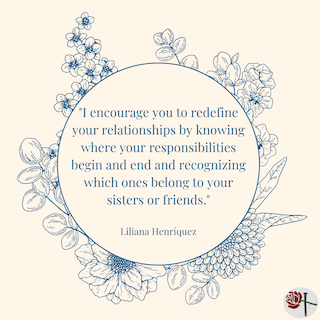 Written by Liliana Henríquez, volunteer with Iron Rose Sister Ministriesin Colombia
Written by Liliana Henríquez, volunteer with Iron Rose Sister Ministriesin ColombiaWhere do you begin and where do I begin?
Why does it sometimes seem as if we become one person instead of being two separate individuals?
Have you ever wondered this?
Sometimes my tastes merge with your tastes and my problems become your problems.
However, it is important to know our boundaries and not assume responsibilities that are not ours to begin with.
When we understand that each of us has our own responsibilities to fulfill, we will stop seeing what happens in our neighbor's house and instead, focus on what happens in ours. It's about acknowledging what God gave us and doing the best you can with it. As we see in the parable of the talents in Matthew 25:14-30, the task was simple: each one would be in charge of multiplying the talents he received. The task was not to see how many talents the friend got and do the work for him. Each one of them had to fulfill their own responsibilities.
I have come to understand that, just like me, the people around me have internal and external resources to face the situations of daily life. Nobody needs to be carried like a baby. We, as adults, have the potential to use the resources available to us. In addition, we count on the extraordinary help of the Holy Spirit to guide us at all times and intercede for us before God when we do not even know what to ask for (Rom. 8:26).
Okay then, if I know that you are capable of taking care of yourself, why is it difficult for me not to get so involved in your life?
Because I am not sure what my boundaries are!
When this happens, out of a motivation to keep up appearances, we get involved in situations in which we have not been called, we give opinions that we have not been asked for, and we accept tasks that we do not really want to do.
I encourage you to redefine your relationships by knowing where your responsibilities begin and end and by recognizing which ones belong to your sisters or friends. If each of us guards our own heart and takes care of ourselves, we will have more pleasant and easy-going friendships. After all, no one likes to carry other people's problems! While we may be willing to help, we should always have the discipline to establish boundaries, so that we don’t allow those we love to grow dependent on us but rather allow them to gain strength and experience through their trials. By establishing our boundaries, we do not become involved in an unhealthy way.
It’s one thing to help and support each other. We have been called to love one another, but to assume other people's responsibilities is a very different thing.
It is time to clearly define the terms of our relationships and establish healthy boundaries.
-
Building Relationships with our Children and Grandchildren
Written by Brenda Davis, volunteer with Iron Rose Sister Ministries in Arkansas
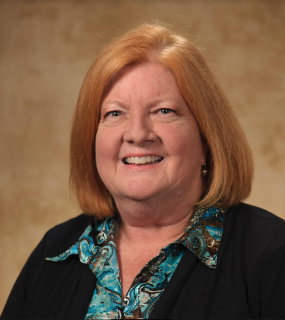
Be careful, and watch yourselves closely so that you do not forget the things your eyes have seen or let them fade from your heart as long as you live. Teach them to your children and to their children after them. (Deut. 4:9 NIV)
While barely mentioned in the New Testament, two Christian women, Lois and Eunice, were no doubt familiar with this scripture due to their Jewish heritage. It is evident that they practiced this teaching because we read of the influence they had on their grandson/son, Timothy, one of the most impactful missionary preachers in the early church. Here are the only two passages that mention these women:
I am reminded of your sincere faith, which first lived in your grandmother Lois and in your mother Eunice and, I am persuaded, now lives in you also. (2 Tim. 1:5)
Now Paul also came to Derbe and to Lystra. And a disciple was there, named Timothy, the son of a Jewish woman who was a believer, but his father was a Greek, and he was well spoken of by the brothers and sisters who were in Lystra and Iconium. (Acts 16:1)
If only we knew more about the specifics of how they raised Timothy. Did they give him time out when he misbehaved? Did he have a curfew? Did they make him go to church when he didn’t want to? We can be sure that, like us, they were not perfect as grandmother and mother. But we know that despite their imperfections they were successful in raising someone who chose to devote his life to Christ and His church, as we read in 1 Corinthians 4:17.
So, what can we learn from these women? We learn that the relationship between us and our children and grandchildren is incredibly impactful—even essential—to their spiritual upbringing. We also learn that even if our spouse is not a believer, we can still have a relationship that results in blessing these young souls. Acts 16:1-2 tells us that while his father was a Greek unbeliever, Timothy’s mother was still successful in teaching him about Christ.
It is universally agreed that the relationship between a mother and child is important. But there are also multiple verses and examples in the Bible that show us the importance of grandparents and the positive and negative results of this relationship. Whether we live near, or even with, our children or grandchildren, or clear across the country or the world, we are still called to maintain a relationship that will strengthen their relationship with the Lord. Author Mickey Elliott says, “It is the grandparent's responsibility to encourage, love, bring peace and unity. Never speak negatively about either parent to the grandchildren, but always encourage love, forgiveness, unselfishness, and understanding.”
How can we build and maintain these influential relationships?
- By example -living out our faith in words and actions.
But if a widow has children or grandchildren, let them first learn to show godliness to their own household.(1 Tim. 5:4 ESV)
Our children and grandchildren observe how we treat and serve others, how we react to life’s events, and whether or not we are striving to be like Jesus.
- By teaching -sharing God’s Word from day one at every little opportunity.
But as for you, continue in what you have learned and have become convinced of, because you know those from whom you learned it, and how from infancy you have known the Holy Scriptures. (2 Tim. 3:14-15 NIV)
Take advantage of “teachable moments,” sharing Biblical truths in everyday situations. This can be as simple as replacing, “What a beautiful day,” with “What a beautiful day God made for us,” as you look out the window together.
- By praying -unceasingly taking them before the throne of grace.
Do not be anxious about anything, but in every situation, by prayer and petition, with thanksgiving, present your requests to God.(Phil. 4:6-7)
Pray with and for them—their health, their choice of friends, their future spouses, and protection from the tempter.
An unknown writer has said, “Having [kids and] grandkids is a blessing. Helping to shape their lives is an honor,”andScripture supports this statement.I particularly like the Contemporary English Version’s rendition of Psalm 127:4-5, “Having a lot of children to take care of you in your old age is like a warrior with a lot of arrows. The more you have, the better off you will be.” And Proverbs 17:6 (NLT) tells us that “grandchildren are the crowning glory of the aged.”
May we all be mindful of the spiritual legacy we will leave our children and grandchildren.
-
Burdened Relationships
Written by Kat Bittner, volunteer and member of the Board of Iron Rose Sister Ministries in Colorado
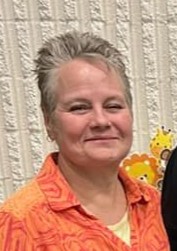
“Carry each other’s burdens, and in this way you will fulfill the law of Christ” (Gal. 6:2 NIV).
“A true relationship is two imperfect people refusing to give up on each other” (Unknown). That could not be a more fitting description for us as humans in relationship with each other. Relationships are often hard. They take a great deal of commitment and effort on our part to be even the least bit fulfilling. Our sinful nature, clothed in selfish desire, often keeps us from working on relationships as we should. But like anything else in life that is good, we need to ensure that God is at the forefront of our relationships and that He is the reason we do what we do. “Whatever you do, work at it with all your heart, as working for the Lord, not for men”
(Col. 3:23).
God designed relationship, and He designed it to be a reciprocal effort; each person brings something to the relationship that is equally satisfying. Consequently, the best relationships are enveloped in a common love (1 Cor. 13:4-7). The best relationships build us up rather than tear us down (1 Thes. 5:11). The best relationships are burdened relationships.
Burdened relationships are those that involve mutual dependence on each other. We should be dependent on others (most assuredly our sisters in Christ) for several things. We need each other for guidance as “the heartfelt counsel of a friend is as sweet as perfume and incense,” and “as iron sharpens iron, so a friend sharpens a friend” (Prov. 27:9,17 NLT). We need each other for spiritual restoration for “…sisters, if another believer is overcome by some sin, you who are godly should gently and humbly help that person back onto the right path (Gal. 6:1). We need each other forinstruction on how to live as godly women (Titus 2:3-5).
Perhaps the most important thing we can do for each other as sisters in Christ is to share those things which encumber or afflict us. Sin and the struggles of life can weigh us down with extreme heavyheartedness. The burdensome stuff of life can discourage and weaken our spiritual state. We should never be embarrassed or ashamed to share those things which weigh heavily on our hearts. The adage “there is strength in numbers” is very true, especially when it concerns our spiritual health. The author of Ecclesiastes proclaims that “two are better than one because they have a good reward for their labor…and a threefold cord is not quickly broken” (Eccl. 4:9,12 ASV).
We cannot do life in any capable fashion without strong relationships. We must be willing to share our burdens with our sisters in Christ. In doing so, we afford them the powerful healing that comes from prayer, thereby encouraging them on to a better, stronger faith. “Pray for each other so that you may be healed. The earnest prayer of a righteous person has great power and produces wonderful results” (James 5:16, NLT).
Our burdens need to be shouldered by each other so faith can reach its crowning achievement.Faith is made stronger when our relationships with each other better mimic our relationship with God. When our relationships with each other are more authentic, transparent, and persevering, we can better cope with the heaviness that life brings us and others. Shouldering our burdens with one another is a key element for building good relationships because it also demonstrates selflessness. And we truly live by the tenets of Jesus’ teaching when we humble ourselves enough to selflessly carry the burdens of others (Phil. 2:3, Rom. 13:8; Gal. 5:13; 2 Jn. 1:6). Even more wonderful is that we can have our burdens shouldered by Jesus, too. In fact, He expects it of us. He whose burden is light asks us to burden Himself with our heaviness.“Come to me, all you who are weary and burdened….my yoke is easy, and my burden is light” (Matt. 11:28,30 NIV).
Sisters, we cannot afford to be stagnant or self-righteous in our relationships. Good relationships require effort and perseverance. We must be committed to working selflessly in our relationships if we are to be pleasing to God. Relationships can fuel our faith because they require a refusal to give up on each other just as God refuses to give up on us. God has “chosen you and will not throw you away”(Is. 41:9 NLT). A burdened relationship demonstrates a faithful work. It is a good thing! How will you be burdened by your relationships?
-
But God
 Written by Wendy Neill, Advancement Coordinator for Iron Rose Sister Ministries in Searcy, AR
Written by Wendy Neill, Advancement Coordinator for Iron Rose Sister Ministries in Searcy, ARI have a math problem for you. Ready? What is the solution to this formula?
((1,874,309 / 45) + 593,482 – (23 * 497,833) + 4,349 – (4 * 597)) * 0
I hope you didn’t work too hard on that. Did you catch the part at the end? The “times zero”? That changes everything. The answer is simply zero.
It doesn’t matter how complicated or lengthy the math problem. If you add “times zero” at the end, everything is made simple. The answer will always be zero.
It is the same way with these two words: “but God.” When you add God to the mix, everything changes. Today we are going to talk about how adding God to a relationship can redefine the relationship.
Let’s look at Daniel. Daniel was a servant and a captive of King Nebuchadnezzar. The king had besieged and conquered Judah and hauled off the strong and talented young men to serve him. In chapter one, we see Daniel, Shadrach, Meshach, and Abednego refuse to defile themselves with the king’s food. They risked the king’s anger with this refusal, but it paid off. This was their first test.
In chapter two, things heat up a bit. This time, the king has a frightening dream. He demands that someone among his advisers not only interpret the dream, but also describe the dream. If they don’t, he will kill them all! This includes Daniel and his friends.
Daniel doesn’t try to calm the king or reason with him. He doesn’t try to call in favors, pay bribes, or work political angles to avoid this fate. He turns to God in prayer. And it changes everything. Daniel goes to bed as a servant of the king who was under a death sentence. But God reveals the dream to him during the night and within 24 hours the king makes Daniel a ruler over the entire province of Babylon and places him in charge of all its wise men. God completely redefines the relationship between Daniel and the king!
What other relationships in the Bible do you see redefined when God is added to the mix? What relationships in your own life are complicated and hard? Have you asked God to come into the middle of that relationship? What might happen if He did?
This Saturday, May 8th, at 9:30 am CDT we will have our monthly virtual ladies Bible study on “Relationships Redefined.” I will be speaking to the English-speaking women and Brenda Brizendine will be speaking to the Spanish-speaking women. I will be delving further into this topic, but I also want to hear from you during that time. Join us and share your own insights on how God redefines relationships.
-
If They Divide Us, They Will Conquer Us – Don't Let the Challenges of Relationships Cost Us the Victory
Written by Nilaurys Garcia, volunteer with Iron Rose Sister Ministries in Canada

What a joy it is when you get along with all of the people in your circle, or those with whom you associate. There is a sense of peace in those moments and it can be even a little scary because you wonder when something might go wrong in one of those relationships. If I tell you that having differences of opinion is normal and that you can't get along with everyone all of the time, chances are, you'd agree with me. It's easy to have a good relationship with someone with whom you always get along and who thinks like you. It requires more effort when there have been exchanges of not-so-friendly words or when the other person has hurt your feelings.
You may have heard the phrase, “divide and conquer.” It is a well-known strategy in games, in wars, and in situations where the enemy must be separated so their strength will be weakened, most of the time because they will not have the support of a team. Sometimes I have used this strategy to complete a project by having the team split up the tasks and thereby conquering the goal.
Taking it to a more personal and relational level, I have tried to divide or separate people from the way they behaved in the past. I remember who they are and how they responded, and that helps me have a clearer and more objective approach as I deal with the current situation. While a negative impression based on past events will certainly impact our response, it should not determine the way we deal with a current situation. When we separate the bad from the good, we will get better results. A relationship can change a lot when the context is changed, meaning the place, the other participants, and even the topics of conversation.
I like to think about the opposite of “divide and conquer,” the sum of everyone’s efforts can outweigh each individual’s work. It sounds a bit complicated, but there´s a reason why the opposite works very well against enemies. Returning to the strategy where activities are separated to achieve a common goal, much more can be achieved when we collaborate for the fulfillment of an objective since there is support and complement. A biblical example is that a rope made of three strands is more difficult to break. "
Though one may be overpowered, two can defend themselves. A cord of three strands is not quickly broken!" (Eccl. 4:12 NIV)
The relationship we have with Christ is easier if we do it in community, instead of trying to do it on our own. On more than one occasion I have needed help from my family in Christ to face a situation, reaffirm my faith, and get much closer to our Creator. When thinking about how to counteract the effects of division, a story that comes to mind is found in Exodus 17:8-13, when Joshua leads the people in battle against the Amalekites.
Moses supported the Israelite army from the top of a nearby hill by holding up the rod of God. If Moses lowered his arms, the enemy would overpower Joshua’s army. To achieve victory, Aaron and Hur supported Moses, holding up both of his arms until sunset. Isn't this story wonderful? I get excited knowing that the united support of a few and the efforts of many gave the victory to Israel. I wonder what would have happened if Aaron had been angry with Moses over some argument between brothers and refused to help him. It would be a very different ending.
Although I have had moments when I have wanted to surrender, I have had the support of the people with whom I have relationships to encourage me to move forward. I see this in the effort of my brethren in preventing the enemy from dividing and conquering me in my Christian walk. When we have differences with others, we cannot let disagreement become a barrier in our relationships, destroy unity, or let one of our brothers or sisters fall simply because they have a different opinion from ours. And at other times, it might very well be me that is the difficult person to love, and the one who needs my loved ones to see beyond my complicated attitude.
Would you join me in staying united to protect the people of God?
-
Intergenerational Relationships Give Us Wisdom
Written by Liliana Henríquez, volunteer with Iron Rose Sister Ministries in Colombia

There is a well-known saying, "Time is money." I believe this means that all the years of life granted by God are very valuable, both for ourselves and for others. Time is not necessarily synonymous with wisdom, but it does equate to experience.
Wisdom is God's gift, and when we are lacking it, we can ask for it and He guarantees that He will give it to us abundantly (James 1:5). Experience brings with it the knowledge and skills we acquire over time. Both are important, necessary, and valuable during our time on earth.
In our daily lives, we come across many challenges and situations that other people have already experienced such as divorce, marriage, raising children, traveling, changes in our work life, and others. And thanks to what we call intergenerational relationships— friendships among people of different ages—we can find better and faster solutions to our problems, always remembering that "wisdom is found in those who take advice" (Prov. 13:10b NIV).
Ruth and Naomi's relationship is an excellent example of a wonderful intergenerational relationship.
Ruth was in the same situation as Naomi—they were both widows. However, Naomi had a plan: return to her homeland, Bethlehem. This was a new place for Ruth, but she agreed to be led by her older and wiser mother-in-law.
Now Naomi had a relative on her husband’s side, a man of standing from the clan of Elimelek, whose name was Boaz. And Ruth the Moabite said to Naomi, “Let me go to the fields and pick up the leftover grain behind anyone in whose eyes I find favor.” Naomi said to her, “Go ahead, my daughter.” (Ruth 2:1-2)
Ruth was a hard-working woman who listened to the advice of her mother-in-law, Naomi, and sought her constant guidance, and the good relationship that she had with Naomi was admirable, so much so that it was publicly recognized.
Boaz replied, “I’ve been told all about what you have done for your mother-in-law since the death of your husband—how you left your father and mother and your homeland and came to live with a people you did not know before. (Ruth 2:11)
Naomi's wisdom and experience guided Ruth to directly seek out a man to redeem her. Following this advice shortened the time to improve her situation and lessened the possibility of making mistakes. Those same benefits can be obtained by all of us today if we develop relationships with older and wiser women.
There are many teachers of good things (Titus 2:3), willing to guide younger ones to avoid stumbling blocks. But to experience this benefit, we need to open ourselves to opportunities for cultivating intergenerational relationships that will allow us to grow personally and spiritually. The benefit is mutual: older women bring wisdom and experience to the younger ones, and younger ones help the older ones actively fulfill their God-given calling to teach others.
“Therefore everyone who hears these words of mine and puts them into practice is like a wise man who built his house on the rock” (Matt. 7:24). Through developing intergenerational relationships, let us be women who build their house, their mind, and their heart on the rock and not on the sand.
-
My Relationship is Being Redefined
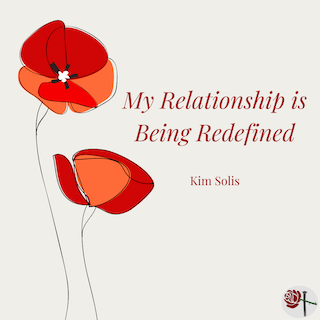 Written by Kim Solis, volunteer with Iron Rose Sister Ministries in Milwaukie, Oregon
Written by Kim Solis, volunteer with Iron Rose Sister Ministries in Milwaukie, OregonI never saw it coming.
I was taught how to be a child and to obey my parents, though I did not always do so, as I sought to do my will and not theirs.
I was advised on how to be a young wife, to respect my husband, though sometimes my impulses lead me into other directions.
I took classes about how to be a mother, to raise my children in the discipline of the Lord, though I have often wondered if I have really done the job, I could have or should have.
Relationships shift and settle as we grow and mature. Experiences and trials shake us up and we have to adapt and change. But, for the most part, we are prepared, if not with tools, at least with knowledge that change is coming.
We know that we will grow up and become independent from our parents.
We know that our marriage will suffer ups and downs and that we can’t take it for granted and that we will have to work at it to make it last.
We know our children will grow and that our relationship with them will also change as they make their own decisions, even ones that we are not completely in agreement with.
But who really talks about the relationship with parents who increasingly become more and more dependent on us as they grow old and their bodies (and sometimes minds) begin to fail?
I’m almost 50. I have been independent from my parents for 3 decades. I have been married for 27 years and we’re at a good, stable, solid place in our marriage. We have raised children and am now enjoying the expanding family as they seek their hearts’ mates and contemplate their own future families. My role as mom is being redefined, and it is a process that is both beautiful and fearful, and immensely satisfying.
But, no one told me. No one warned me. Nothing prepared me for the fact that as I see my own children fly the nest and I contemplate this new stage of life, that I would again be mom. Not for my children, but for my mother.
Honor your mother and your father. (Ephesians 6:2, among others)
We always talk about honoring our parents as obeying them while we are young. But how do we honor them when they are old?
As her health fails, I am constantly being redefined. The obedient daughter who serves as needed, yet making decisions like a mom, making sure all is in order and taken care of.
I can do that. I did it for my kids, I can take care of mom. But no one told me about how my heart would hurt to see the woman who was always so strong, so sure, suddenly weak and forgetful. She was my rock and now she needs me.It is easy to become irritated, to snap back and be impatient. She is not a child. She should be able to do basic things for herself. She always has before. But times have changed and are continually changing.
What does it mean to honor my mother in this stage of life?
Paul’s words to the Galatians give me direction in this, as well in all relationships I have:
But the fruit of the Spirit is love, joy, peace, forbearance, kindness, goodness, faithfulness, gentleness and self-control. Against such things there is no law. Those who belong to Christ Jesus have crucified the flesh with its passions and desires. Since we live by the Spirit, let us keep in step with the Spirit. Let us not become conceited, provoking and envying each other. (Galatians 5:22-26, NIV)
Sometimes, if I am honest, I don’t want this new role. I want my mom to continue to take care of me; I don’t want to take care of her. But it isn’t about what I want. It is about what she needs. She is my mom. The one who took care of me when I could not take care of myself. It is my turn to do what God calls me to do, and the Spirit will give me strength.
It is not the time to treat my mom with impatience, exasperation, authority, and harshness.
I love her. It is a joy to have these times together. I am at peace with what will come, knowing that it is all in God’s hands. I will be patient, giving her the space and calmness to do the things that now are difficult for her. I will treat her with kindness, goodness, and gentleness… faithfully as long as she needs. I have to practice self-control for those times when her weakness causes her to lash out, and above all else, continually place her and myself in God’s hands.
I have understood, through this and other lessons this past year, that it is not about what we live, but HOW we live it. This is not what I would have chosen to live during this past year. But I am living it with great joy and peace, thankful for the opportunity to serve and to honor my mother, as God has asked us to.
Is there something you can do today to honor your mother and father?
-
Relationships Redefined through Love and Communication
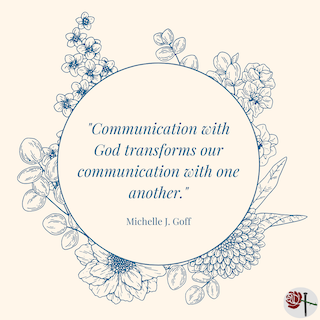 Written by Michelle J. Goff
Written by Michelle J. GoffFor relationships to work, we must work at them. Friendships develop over time and through shared experiences.
Roommates will tell you that clear communication is important. Expectations have to be expressed and explained, then either dismissed, adjusted, or met. Who is going to take out the trash? Do we share meals or do our own? Are you a morning person or a night owl?
For a season, my parents taught a premarital class on first-year adjustments. The blending of two families is not a trivial undertaking. They asked key questions and told funny anecdotes in order to walk the couple through some of the preparation that it takes to make these first-year adjustments. The answers to some questions may appear obvious to one, but the other has a very different way of looking at things. Respectful love and open communication are necessary building blocks for a solid marriage.
Forty-five years later, my parents would tell you respectful love and open communication are still key elements that cannot be ignored. I echo the sentiment of their necessity even though, for me, that has not been evidenced directly through marriage, but rather as foundational factors in the building of all relationships.
Respectful love is not eros love, the romantic type of love that can be fleeting and emotion based. Respectful love is rooted in fileo (brotherly) and agape (unconditional) love, as we find most described in the Bible. First Corinthians 13, for example, presents a love that is not self-seeking. It keeps no record of wrongs.
Love is patient and kind; love does not envy or boast; it is not arrogant or rude. It does not insist on its own way; it is not irritable or resentful; it does not rejoice at wrongdoing, but rejoices with the truth. Love bears all things, believes all things, hopes all things, endures all things.Love never ends.
I don’t know about you, but that type of love seems nearly impossible, unattainable by my own efforts. I can be admittedly selfish. I am least patient with myself, but also impatient with others. My desire to not be taken advantage of leads me to keep a record of wrongs and occasionally be resentful.
In my mind, I know that no matter the type of relationship, if I want it to develop and deepen, it must be grounded in a love that respects the other person, considers his or her needs above our own, and endures.
How do I resolve the distance between the biblical description of love as found in 1 Corinthians 13 and the fallible version of love found in most relationships?
God. Since God is love, I step back and allow Him to define the relationship. Have you thought about having a DTR talk with God? DTR: Define the Relationship.
Because the other way in which we can work toward attaining that kind of love in our relationships is through communication—with God and with the other person.
Not to sound cliché, but sincere, open communication with God through prayer will guide us in redefining our relationships. Communication with God transforms our communication with one another. A foundational relationship with God lays the groundwork for our relationships with others.
Take a moment today to reflect on two relationships you want to see grow. Pray about those two people by name. Ask God to guide your communication. Invite Him, as Love defined, into your conversations and interactions.
-
The Living God of Abraham, Isaac, and Jacob
Written by Elina Vath, Virtual Assistant for Iron Rose Sister Ministries in Ohio

Each week across city, region, country, and hemisphere, we commemorate together the death and resurrection of our Lord and Savior, Jesus Christ, through the Lord’s Supper. Redemption and salvation through Jesus were foretold in the garden of Eden, fulfilled in Jerusalem, and will continue until He returns.
Before His death, Jesus entered Jerusalem as King, just as the prophet Zechariah said He would. And although it was the last week of Jesus’ human life, He did not receive any relief from those who were determined to see Him fail. Time after time, Jesus looked straight into the hearts of the teachers of the law and completely annihilated their arguments. In a single day, Jesus sent the Pharisees, Herodians, and Sadducees home with their tails between their legs.
Chapter 22 of Matthew’s account of Jesus’ life tells us that the Sadducees attempted to trap Him with a question meant to disprove the resurrection. Jesus knew the scheming intention behind the Sadducees’ question for exactly what it was: a weak attempt to show His ignorance of Moses’ teachings, as if Jesus Himself hadn’t been there when Moses floated in a basket on the Nile, murdered the Egyptian, met his wife, removed his sandals, spread his arms over the Red Sea, and breathed his last.
I picture Jesus shaking His head, sighing a heavy sigh, and then effectively bulldozing the Sadducees' trap with these words, “You are wrong, because you know neither the Scriptures nor the power of God” (Matt. 22:29 ESV). No signs of intimidation or hesitation; rather, Jesus spoke with authority. “You are WRONG,” He told the richest, most powerful Jews of the time. But Jesus didn’t stop there. He then accused the Sadducees of not having done their homework, bringing the conversation to a full stop.
And as for the resurrection of the dead, have you not read what was said to you by God: ‘I am the God of Abraham, and the God of Isaac, and the God of Jacob’? He is not God of the dead, but of the living.(Matt. 22:31-32)
You see, Jesus knew Moses personally. And when God said to Moses in the book of Exodus, “I am the God of Abraham, Isaac, and Jacob,” Jesus watched as Moses was overcome by the sheer power of those words. Matthew tells us that Jesus’ wisdom and power in repeating these words had the same impact on the Sadducees and everyone who heard Him speak—they were all astonished.
Everything about God is alive. His words are alive, His Spirit is alive, His Son is alive, His kingdom is alive, and we are part of this living kingdom. Abraham, who looked at the stars in the night sky, as God made a promise, is alive. Isaac, the one through whom God began fulfilling that promise, is alive. Jacob, the forefather of Moses and someone used by God to preserve Jesus’ bloodline, is alive. Those who have gone before us are alive. Generation to generation, here we stand today, thousands of years later, as followers of the God of (the living) Abraham, Isaac, and Jacob.
Because of Jesus, who is the Life, you and I are counted among the stars in heaven. Generation upon generation of God’s people will live even after our bodies die.
May we all rejoice together at the history of our faith family, and that our names are written in the heavens as part of a promise that continues to be fulfilled.
-
Waiting and Watching
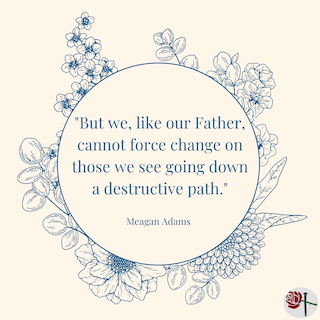 Written by Meagan Adams, volunteer with Iron Rose Sister Ministries in McRae, Arkansas
Written by Meagan Adams, volunteer with Iron Rose Sister Ministries in McRae, ArkansasSome relationships are easy; some are hard. The pandemic exposed many conflicts that were seething under the surface. We’ve divided into “us” versus “them” camps on so many levels. Does anyone else feel that were experiencing another Babel, where we don’t even speak the same language? I felt the relationship challenges most keenly when our adult daughter moved home last fall. After being out of work for nearly a year due to the pandemic, her savings were depleted. We offered her our house to live in. “Not to worry,” said we, “we’re going back to Greece in a couple of weeks and you’ll have the house to yourself.” Virus variants developed, countries experienced new waves of cases, regulations and travel options continually changed. Somehow, a couple of weeks turned into three months.
It’s never easy when an adult child moves home. It’s especially challenging when that adult child has developed a world view vastly different from your own. Every conversation turned into a debate, and I found myself afraid to open my mouth because I felt like I didn’t even speak the same language. I spent a lot of time praying, asking for new ways to relate. I’m still waiting for an epiphany. Things improved, but the relationship challenge is still there – which is not necessarily a bad thing. You see, when our daughter lived away it became easy not to engage at all beyond the surface level. Living together, this was not possible. Even if it’s not easier, the relationship is better because something is actually going on.
I recently thought of a parable in which Jesus uses a family in conflict to relate a spiritual truth. Luke 15: 11-32 tells the story that we commonly call “The Prodigal Son.” Ultimately, it’s about God’s redemption of all people, even those that might be considered unworthy, but we can learn some lessons about family in the story as well. A man has two sons – the easy kid and the hard kid (I’m paraphrasing here). When the “hard kid” asks for his inheritance early, I’m sure the father knew he wasn’t really ready for it. He also knew his son well enough to realize that deterring him would be counterproductive. And so, he let him go. The danger was real; I’m sure we all know stories of prodigals who never returned.
But we, like our Father, cannot force change on those we see going down a destructive path. The change must come from within. We wait, we love, and we watch, as the father in the parable does. Luke’s story has a happy middle when the younger son returns home. Relationship is restored. But, alas, joy is cut short. The older son, the “easy kid,” is resentful. Will the older son get over it? Will his resentment continue to fester? The story ends with this issue still hanging. The father is back to the waiting game. He tells him, “Son, you are always with me, and all that is mine is yours,” (Luke 15:31, ESV) but he can’t force a change to the older son’s heart. All he can do is wait, and love, and watch for the opportunity to connect again.
-
What I Thought I Understood About God
Written by Corina Diaz, volunteer with Iron Rose Sister in Argentina

From a very young age, my personality was leading towards being an Enneagram 9. If you know about the Enneagram personalities, you will know what I mean. If not, this link will take you to some information that may help you understand it in a very illustrative way: The Nine Enneagram Types - Enneagram Explained.
The ability to mold myself into this Enneagram personality type is a result of being raised by a father who was a very severe man. So, I adopted a rather stressful defense mechanism: trying to make everything perfect at home to prevent my father from getting angry.
As a consequence of maintaining this practice for years, I managed to make connecting with God, from the perspective of seeing Him as a loving Father, one of my greatest challenges. This is especially hard when we have grown up with the image of a God who in the old covenant is seen as a strict and demanding Father, demanding the attention of His people.
However, when we look at the story of God and His people from a more global perspective, we observe a God full of grace and tenderness. “For the Lord your God is a merciful God; he will not abandon or destroy you or forget the covenant with your ancestors, which he confirmed to them by oath”(Deut. 4:31 NIV).
There are examples of grace throughout the Bible. Although the Old Testament focuses its attention on justice, mercy also plays an essential role in our understanding of the character of God. “In love a throne will be established; in faithfulness a man will sit on it— one from the house of David—one who in judging seeks justice and speeds the cause of righteousness”(Is. 16:5).
With God, there is no judgment without mercy. “Yet the Lord longs to be gracious to you; therefore he will rise up to show you compassion. For the Lord is a God of justice. Blessed are all who wait for him!”(Is. 30:18)
This new understanding of the old covenant has also changed the way I perceive my relationship with my earthly father and has even allowed me to discover traits of my own personality that I was unaware of. Now I can feel more authentic in my relationship with myself and with God, I feel confident in a love that doesn't desperately need perfection, it just needs me to be willing to live in His home forever as we are promised in Psalm 23:6. “Surely your goodness and love will follow me all the days of my life, and I will dwell in the house of the Lord forever.”
In this way, Christ can do his work.“My grace is sufficient for you, for my power is made perfect in weakness”(2 Cor. 12:9a).
See more photos on our Photo Gallery page.
(c) Iron Rose Sister Ministries. Site setup by Perfect Fit Web Design; Flag icons by Free Flag Icons

